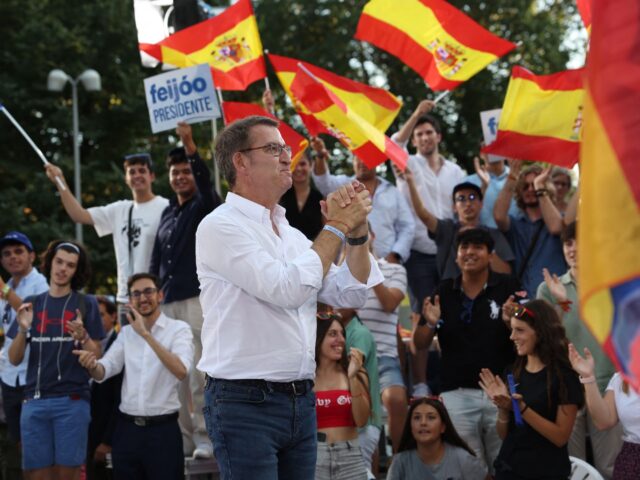The centre-right People’s Party (PP) has been given the first opportunity to form a government in Spain after last month’s inconclusive elections resulted in no party securing enough seats in the Congress of Deputies for an outright majority, but the electoral arithmetic makes fresh national elections likely.
On Tuesday, the Zarzuela Palace announced that King Felipe VI of Spain has decided to give PP leader Alberto Núñez Feijóo the right to try to form a government given that his party was “the political group that has won the highest number of seats in the last elections on July 23,” the ABC newspaper reports.
In the tightly contested elections, the People’s Party secured a vote share equating to 137 seats in the Congress of Deputies, besting current Prime Minister Pedro Sánchez’s Spanish Socialist Workers’ Party (PSOE), which won 121 seats. However, with neither leading party gaining enough to meet the threshold of 176 seats for an outright governing majority, Feijóo and Sánchez have been left to seek the support of smaller parties to form a government.
Yet a month after the election neither leader has so far been able to cobble together a firm coalition, with the PP currently standing at 172 with the 33 seats of the populist VOX party, and the regional conservative Unión del Pueblo Navarro party and centrist Coalición Canaria. If there is no progress, the only option left will be fresh national elections in the winter.
Following the backing of the King to try to form a government Alberto Núñez Feijóo said: “We will give voice to the more than 11 million citizens who want change, stability and moderation with a Government that defends the equality of all Spaniards.”
“I have shown the King my willingness to be a candidate for the investiture if the head of state considers it so,” Feijóo added, saying that he would in return seek to “honour and loyalty to the nation and the constitutional Monarchy.”
It remains to be seen if the People’s Party will secure enough votes to make Feijóo prime minister, with hopes currently riding on convincing the Basque nationalist party (PNV) to throw its support behind him. This may be a tough sell, however, given that the party has so far refused to join a coalition involving the populist VOX party, given its fierce opposition to separatist parties.
Right Wing Bloc First in Spain Elections But Falls Seven Seats Short of Majority… Socialist PM Sánchez Could Cling to Power with Help of Catalonian Separatists https://t.co/SR0zOl0mYq
— Breitbart London (@BreitbartLondon) July 24, 2023
VOX, which prior to the election had hopes of entering into government for the first time, agreed after the disappointing election results from the PP, to merely back the party without demands of government posts in the hopes that such a concession would make it easier for Feijóo to court the support of other potential allies.
After meeting with the King, himself, this week Populist leader Santiago Abascal said that he informed the monarch that VOX would back the PP on the condition that the party “promises to end the stigmatisation of VOX voters,” agrees to publicly acknowledge the value of their partnership, will not pursue a policy of “cordon sanitaire” to politically blackball the populists, and to reinstitute political neutrality in state institutions.
“I hope that, from now on, the enemies of governmental agreements between PP and Vox will refrain from jeopardising the construction of the alternative. Now a new stage of collaboration opens between two very different political formations, very distant, but capable of respecting and agreeing when necessary,” he said.
Meanwhile, Prime Minister Sánchez — who is currently serving as a caretaker PM — has cobbled together 171 seats, largely on the baking of the leftist Sumar bloc. Despite having secured fewer votes than the PP and currently trails the centre-right party by one when commitments from other parties are counted, the socialist prime minsiter may actually have an easier path to victory, given that he only has to convince a few politicians from the Catalonian separatist Junts party to back his candidacy.
It is expected the vote to confirm or not a new Prime Minister will take place on September 26th. Should the Popular Party fail to secure a majority in the first round it will be given a second opportunity in which a simple majority will suffice. If they fail in the second round, Sánchez and his socialists will be given the chance to try to form a government of their own. In the case of neither the PP nor the PSOE succeeding in doing so another snap election will be held, most likely over Christmas or in January.
Spanish Socialists May Cling on to Power After Inconclusive National Election https://t.co/IHCuNoFauB
— Breitbart London (@BreitbartLondon) August 17, 2023

COMMENTS
Please let us know if you're having issues with commenting.